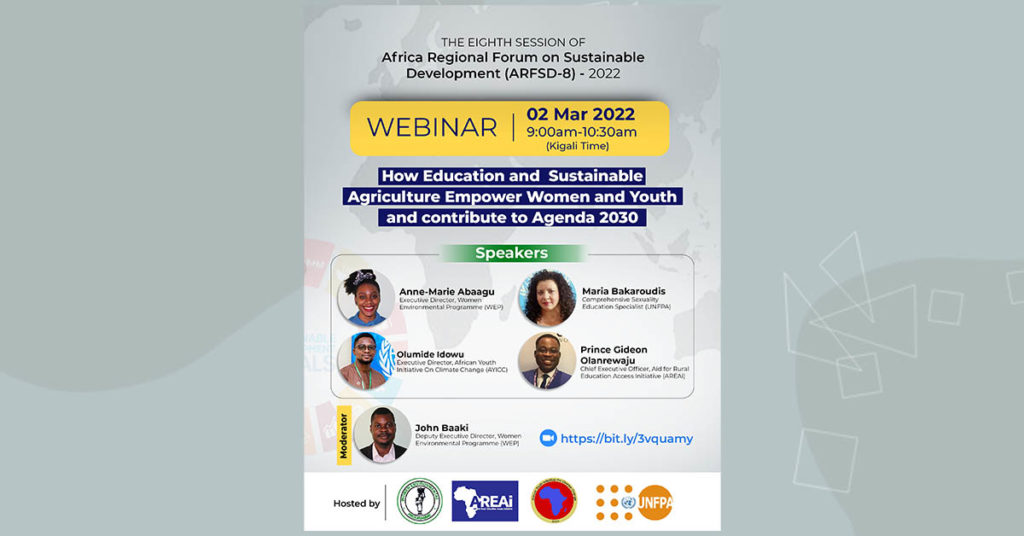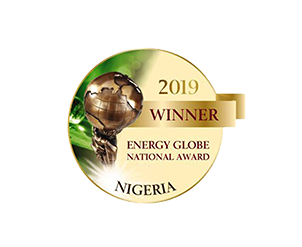
8TH AFRICAN REGIONAL FORUM ON SUSTAINABLE DEVELOPMENT- Side Event
Highlight and outcome of the side event titled “How education and sustainable agriculture empower women and youth and contribute to Agenda 2030”
The side event titled: “How education and sustainable agriculture empower women and youth and contribute to Agenda 2030” was organized by Women Environmental Programme (WEP) in collaboration with African Youth Initiative on Climate Change (AYICC), Aid for Rural Education Access Initiative (AREAi), and United Nations Population Fund (UNFPA). This event was held via Zoom app on 2nd March 2022 from 9:am to 10:30 am Kigali time.
The objective of the event was to share experiences on what the partners were doing to advance the achievement of the SDGs and African Agenda 2063. Specifically, the event shared experiences on organic and sustainable agriculture; Climate Change and Comprehensive Sexuality Education (CSE); women and youth empowerment, and education.
Each speaker at the event focused on one or two of the objectives of the side event which were in line with the SDGs under review (Goals 4, 5, 14, 15 and 17) at the 8th session of the Africa Regional Forum on Sustainable Development.
The following were the speakers at the event: Olumide Idowu, Executive Director, African Youth Initiative on Climate Change, spoke on the role of African youth in achieving a green Africa and Agenda 2063; Maria Bakaroudis, Comprehensive Sexuality Education Specialist at UNFPA, spoke on how Comprehensive Sexuality Education (CSE) can help address gender inequality in Africa in the face of growing climate impact; Anne-Marie Abaagu, Executive Director, Women Environmental Programme (WEP), spoke on how sustainable agriculture promotes gender equality and green growth in Africa; while Prince Gideon Olanrewaju, Chief Executive Officer, Aid for Rural Education Access Initiative (AREAi), spoke on how education can help Africa to build forward better for a green, inclusive and resilient continent.
For Africa to be able to build forward better, for a green, inclusive, and resilient continent, poised to achieve the 2030 Agenda and Agenda 2063, the event came out with the following recommendations:
- Africa should implement climate education in educational institutions as it encourages behavioral change towards sustainable production and consumption. This should also focus on vocational skills development for climate jobs and green entrepreneurship.
- Africa should harness the potential of the youth as they remain one of the huge resources Africa has, to achieve a green, inclusive and resilient Africa. There should be more deliberate efforts by African governments to ensure participation of youth in all development processes in Africa.
- Comprehensive sexuality education is important as it enables young people to protect and advocate for their health, well-being and dignity by providing them with a necessary toolkit of knowledge, attitudes and skills. It is a precondition for exercising full bodily autonomy, which requires not only the right to make choices about one’s body but also the information to make these choices in a meaningful way. And because these programmes are based on human rights principles, they advance gender equality and the rights and empowerment of young people.
- Agriculture shouldn’t be the reason for biodiversity loss in Africa. Africa should adopt sustainable agriculture that preserves biodiversity and enhances food security. This practical guide to preparing organic fertilizers and pesticides can help small-scale farmers in Africa to adopt sustainable practices.


